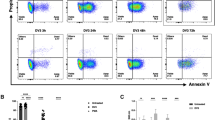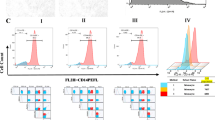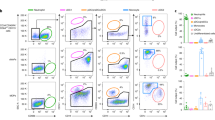Abstract
Neutrophils are also known to acquire the characteristics of dendritic cells (DCs) under the appropriate conditions. In this study, neutrophils were cultivated in vitro in the presence or absence of compounds modulating their survival in an attempt to characterize the expression profile of the DC markers. Higher MHC-II, CD80, CD86, CD83, and CD40 expression levels were detected on the surface of the cultured neutrophils for 24 h than on the freshly isolated cells. The annexin V-positive cells showed a higher expression level of the DC markers than the annexin V-negative cells. The population of neutrophils double stained with annexin V and the DC markers increased after being incubated with agonistic anti-Fas Ab. LPS, the anti-apoptotic compound, decreased the CD86 and MHC-II expression levels but 50-60% of the DC marker-positive cells were detected in the annexin V-positive cells. In contrast, CD80, CD86, CD83, and HLA-DR mRNA levels increased in the GM-CSF-treated neutrophils but not in the anti-Fas Ab-treated neutrophils. T cell proliferation was inhibited by co-culturing them with anti-Fas Ab- or LPS-treated neutrophils at a high neutrophil:T cell ratio. However, the superantigen-mediated T cell proliferation was increased by the LPS-treated neutrophils but decreased by the anti-Fas Ab-treated neutrophils. There was a lower level of interferon-γ production in the T cells co-cultured with anti-Fas Ab-treated neutrophils than with the LPS-treated neutrophils. This suggests that apoptotic neutrophils express DC markers on their surface and the differential expression of DC markers might have a detrimental effect on the immune reaction.
Similar content being viewed by others
Article PDF
Author information
Authors and Affiliations
Rights and permissions
This is an Open Access article distributed under the terms of the Creative Commons Attribution Non-Commercial License (http://creativecommons.org/licenses/by-nc/3.0/) which permits unrestricted non-commercial use, distribution, and reproduction in any medium, provided the original work is properly cited.
About this article
Cite this article
Park, HY., Jin, JO., Song, MG. et al. Expression of dendritic cell markers on cultured neutrophils and its modulation by anti-apoptotic and pro-apoptotic compounds. Exp Mol Med 39, 439–449 (2007). https://doi.org/10.1038/emm.2007.48
Published:
Issue date:
DOI: https://doi.org/10.1038/emm.2007.48
Keywords
This article is cited by
-
Regulatory T cells contribute to the immunosuppressive phenotype of neutrophils in a mouse model of chronic lymphocytic leukemia
Experimental Hematology & Oncology (2023)
-
Clinical study of co-treatment with DC-CIK cells for advanced solid carcinomas
The Chinese-German Journal of Clinical Oncology (2011)



